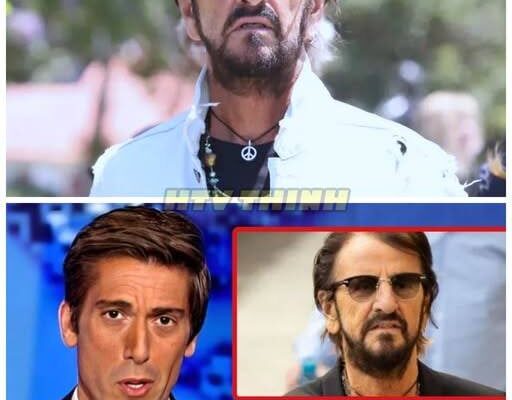In the realm of music, few figures are as renowned as Ringo Starr.
As the esteemed drummer of The Beatles, he played an essential role in defining the sound of an entire generation.
Now, at 84 years old, Ringo is prepared to unveil insights that may alter our understanding of the dissolution of one of history’s most celebrated bands.
Beneath his steady rhythms and affable demeanor lies a remarkable narrative of perseverance, camaraderie, and the intricacies of celebrity.
Born Richard Starkey in Liverpool, Ringo endured a difficult upbringing.
Raised in a working-class household, he confronted health challenges and financial hardships.
Nevertheless, these adversities only intensified his love for music.
From a young age, Ringo was enchanted by the beats of rock and roll.
His musical journey commenced when he joined a local band, The Hurricanes, where he refined his drumming abilities.
However, it was his fortuitous encounter with John Lennon, Paul McCartney, and George Harrison that would forever alter his destiny.
In 1962, Ringo officially became the drummer for The Beatles, a group that would soon captivate audiences worldwide.
The synergy among the members was palpable, and their distinctive sound struck a chord with millions.
Chart-topping songs like “I Want to Hold Your Hand” and “Hey Jude” propelled them to extraordinary heights of fame.
Yet, as the band’s popularity escalated, so did the accompanying pressures.
In a recent interview, Ringo reflects on the impact of fame on the group.
“It was a whirlwind,” he reminisces. “We were young, and suddenly the world was at our feet. But with that came expectations, and it was overwhelming.”
As time progressed, the dynamics within The Beatles began to evolve.
Creative disagreements surfaced, leading to rising tensions among the members.
Ringo reveals that the strains of fame, coupled with personal challenges, contributed to the fractures in their once unbreakable unity.
In the interview, he also addresses the persistent rumors regarding Yoko Ono’s role in the band’s breakup.
“Yoko was a significant part of John’s life,” Ringo states.
However, it was not solely her presence that led to the division.
Numerous factors contributed to the situation.
As the band traversed the challenging landscape of fame, Ringo and his fellow musicians confronted their individual struggles.
John Lennon was wrestling with his artistic identity, while Paul McCartney fought to retain creative authority.
George Harrison, feeling eclipsed, aimed to establish his own musical persona. Ringo, often serving as the mediator, found himself entangled in these disputes.
“I simply wanted us to remain united,” he expresses.
“Yet, at times, one must acknowledge that change is inevitable.”
The pivotal moment arrived in 1969 when the band commenced recording what would ultimately be their last album, “Let It Be.”
The studio environment was fraught with tension, as each member brought their grievances to the forefront.
Ringo characterizes the experience as “painful,” observing that the joy of music-making had been overshadowed by discord.
“It felt as though we were losing something truly special,” he reflects.
As the recording sessions continued, it became evident that the band was growing apart.
John and Yoko’s relationship emerged as a significant source of tension, but Ringo stresses that it was merely one aspect of a broader issue.
“Yoko was significant to John, and that was something we all needed to accept,” he clarifies.
“However, it was not the only reason for our separation.”
In the years that followed the breakup of The Beatles, each member pursued their own solo endeavors. Ringo achieved success with songs like “It Don’t Come Easy” and “Photograph.”
Nevertheless, the legacy of The Beatles cast a long shadow over his accomplishments. In the interview, Ringo contemplates the bittersweet nature of their shared history.
“Being a part of The Beatles was both a blessing and a burden,” he confesses.
“While I take pride in what we achieved, it is challenging to escape that legacy.”
As time went on, Ringo gained a deeper insight into the intricacies of their separation.
He acknowledges that each member had to forge their own path, and at times, that meant moving in different directions.
Regardless of past events, we maintain mutual respect for one another as both artists and friends.
This lasting friendship exemplifies the affection and camaraderie that once characterized The Beatles.
As Ringo reflects on his life and career, he recognizes the significance of accepting change.
“Life is about growth,” he asserts.
“We all evolve, and that’s perfectly fine.”
His journey from the streets of Liverpool to the pinnacle of rock stardom illustrates resilience and the strength of friendship.
In the interview, Ringo highlights the necessity of understanding and compassion during challenging times.
“Music unites people,” he concludes.
“It serves as a universal language that transcends differences.”
As he reminisces about his remarkable journey, Ringo Starr stands as a beacon of hope and inspiration for future generations.
His narrative reminds us that even in the face of conflict, love and respect can endure.
In a constantly evolving musical landscape, Ringo exemplifies the lasting influence of rock and roll.
By sharing his experiences, he aspires to motivate others to embrace their individual paths, regardless of the obstacles they may encounter.
With a sparkle in his eye, Ringo Starr eagerly anticipates the future, prepared to continue his legacy in the dynamic world of music.
His insights regarding Yoko Ono and the dissolution of The Beatles may alter historical perspectives, yet they also provide a deeper comprehension of the intricacies of fame and friendship.
As the world continues to honor The Beatles’ music, Ringo remains a cherished figure, reminding us that the rhythm of life persists.
With every beat of his drum, Ringo Starr continues to inspire generations, demonstrating that music never truly fades away.
Ultimately, it’s not solely about the melodies played or the lyrics sung; it’s about the connections forged and the stories exchanged.
For Ringo, that embodies the true spirit of rock and roll.



